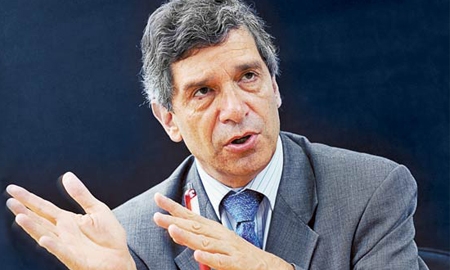The news was especially well received by Colombian guild members, as the main reason for the country to be on the list in the first place was the historic violence and discrimination against them. Today, this treatment has changed drastically and the Government has put in place “a personal protection system so advanced that it doesn’t even exist anywhere else in the world,” explains Colombia’s Labor Minister Rafael Pardo. The program is run by the Department of the Interior and it protects around 12,000 people, aside from government employees, amongst them over 1,000 guild leaders, some of which have personal security and armored cars.
“Of course, that is not an ideal scenario. Ideally, there would be no need for these protection measures. But there has been a great reduction of violence and murders of guild members – although any number higher than zero is absolutely unsatisfactory,” says Mr. Pardo, and he states: “Colombia has taking its violent past very seriously and is searching for a way to offer more protection and less impunity on these crimes.”
Mr. Pardo has also explained that his Department and the Santos Government have been taking interesting steps, such as starting a negotiation process with government guilds and signing an agreement with them that included raising salaries and improving working conditions of more than 1 million employees. “This was one of the advances the International Labor Organization (ILO) took into account when it made its decision”, states Mr. Pardo. In his words, it’s a triple effort: “The Department of the Interior coordinates, the district attorney’s office investigates, and the Department of Labor negotiates with the workers.”
But the Minister’s efforts are not dedicated exclusively to guild members. He classifies protecting the Colombian people’s rights as the “center of attention of the Department of Labor”. This Department’s actions are particularly relevant because of the impact they are having.
In fact, two years ago the Department of Labor didn’t even exist. President Santos created it again after it had disappeared over 10 years before his presidency. “The purpose of the creation of this Department was for the Colombian working class to have its rights guaranteed and so labor can serve as protection,” adds Mr. Pardo, explaining that through their jobs people can have access to insurance and health benefits. “We also want to protect our older generations. Today our protection for people of advanced age only reaches 30% of the population – we want to make it 80%,” says Mr. Pardo.
It is no secret that women work in less favorable conditions in comparison to men in almost every country in the world. The World Economic Forum, which publishes the preeminent ranking on gender gap issues, has ranked Colombia in 35th place this year. “The health and education gap was closed (in Latin America) years ago. So it’s a continent ready to take off in terms of labor and political participation,” says Saadia Zahidi, one of the report’s authors.
Helping make that possible is precisely one of Mr. Pardo’s goals. “Women suffer from discrimination for cultural reasons in certain jobs, unemployment is higher for women and we have polls that tell us that in the private sector women make up to 20% less money than men while having the same positions,” he explains. To balance the situation, his Department employs certain policies like strengthening the inspection programs to make sure there are no invisible barriers to gender equality. “We are stimulating many companies to adopt a series of practices so they can obtain a gender equality certification,” says Mr. Pardo and he adds: “Culture is the most important part of this, a culture of equality.”
One of the Government’s most relevant reforms has been the creation of the First Employment Law, which tries to make it easier for the younger generations to get jobs and for informal workers to get on the grid. Mr. Pardo says it was one of the main reasons why he came onboard with the current Government. “You can now formalize a business quickly and easily with up to four years without any administration costs for the company,” says Mr. Pardo, and explains that this way, informal workers will see that formalizing their businesses is worth it and does not cost a lot of money.
“It also promotes the employment of people under 28 years of age. Companies that employ youths of under 28 will see a reduction in their taxes, around a 13% reduction,” explains Mr. Pardo, who also points out that Colombia’s youth unemployment is falling every year.

0 COMMENTS